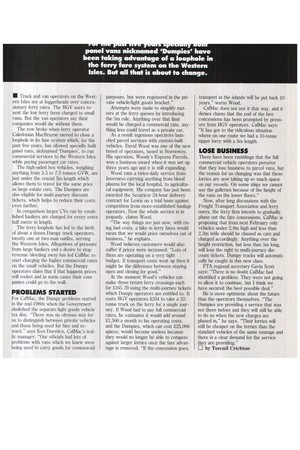• Truck and van operators on the Western Isles are
Page 45

If you've noticed an error in this article please click here to report it so we can fix it.
at loggerheads over concessionary ferry rates. The HGV users resent the low ferry fares charged to small vans. But the van operators say their companies would die without them.
The row broke when ferry operator Caledonian MacBrayne moved to close a loophole in its fare system which, for the past five years, has allowed specially built panel vans, nicknamed Dumpies', to run commercial services to the Western Isles while paying passenger car rates.
The high-sided box vehicles, weighing anything from 3.5 to 7.5 tonnes GVW, are just under the crucial 5m length which allows them to travel for the same price as large estate cars. The Dumpies are also eligible for multi-journey discount tickets, which helps to reduce their costs even further.
In comparison larger CVs run by established hauliers are charged for every extra half metre in length.
The ferry loophole has led to the birth of about a dozen Dumpy truck operators, mostly one or two-man outfits, serving the Western Isles. Allegations of pressure from large hauliers and a desire to stop revenue bleeding away has led CalMac to start charging the higher commercial rates on the small vehicles. But the Dumpy operators claim that if that happens prices will rocket and in some cases their companies could go to the wall.
PROBLEMS STARTED
For CalMac, the Dumpy problems started in the mid-1980s when the Government abolished the separate light goods vehicle tax disc. "There was no obvious way for us to distinguish between private vehicles and those being used for hire and reward," says Ken Duerden, CalMac's traffic manager. "Our officials had lots of problems with vans which we knew were being used to carry goods for commercial purposes, but were registered in the private vehicle/light goods bracket."
Attempts were made to simplify matters at the ferry queues by introducing the 5m rule. Anything over that limit would be charged a commercial rate, anything less could travel as a private car.
As a result ingenious operators launched parcel services with custom-built vehicles. David Wood was one of the new breed of operators, based in Stornoway. His operation, Woody's Express Parcels, won a business award when it was set up three years ago and it is still expanding.
Wood runs a twice-daily service from Inverness carrying anything from blood plasma for the local hospital, to agricultural equipment. His company has just been awarded the Securicor 24-hour delivery contract for Lewis on a trial basis against competition from more-established haulage operators. Now the whole service is in jeopardy, claims Wood.
"The way things are just now, with rising fuel costs, a hike in ferry fares would mean that we would price ourselves out of business," he explains.
Wood believes customers would also suffer if prices were increased: "Lots of them are operating on a very tight budget. If transport costs went up then it might be the difference between staying open and closing for good."
At the moment Wood's vehicles can make three return ferry crossings each for 2165.70 using the multi-journey tickets which Dumpy operators are entitled to. It costs HGV operators 2254 to take a 32tonne truck on the ferry for a single journey. If Wood had to pay full commercial rates, he estimates it would add around £1,500 a month to his operating costs, and the Dumpies, which can cost £25,000 apiece, would become useless because they would no longer be able to compete against larger lorries once the fare advantage is removed. "If the concession goes, transport in the islands will be put back 10 years," warns Wood.
CalMac does not see it that way, and it denies claims that the end of the fare concessions has been prompted by pressure from HGV operators. CalMac says: "It has got to the ridiculous situation where on one route we had a 10-tonne tipper lorry with a Sin length.
LOSE BUSINESS
There have been rumblings that the full commercial vehicle operators perceive that they lose business to parcel vans, but the reason for us changing was that these lorries are now taking up so much space on our vessels. On some ships we cannot use the galleries because of the height of the vans on the lower floors."
Now, after long discussions with the Freight Transport Association and ferry users, the ferry firm intends to gradually phase out the fare concessions. CalMac is proposing that from next February only vehicles under 2.9m high and less than 2.3m wide should be classed as cars and charged accordingly. Anything over the height restriction, but less than 5m long, will lose the right to multi-journey discount tickets. Dumpy trucks will automatically be caught in this new class.
FTA regional secretary Gavin Scott says: "There is no doubt CalMac had identified a problem. They were not going to allow it to continue, but I think we have secured the best possible deal."
He is more optimistic about the future than the operators themselves. "The Dumpies are providing a service that was not there before and they will still be able to do so when the new charges are phased in," he says. "Their lorries will still be cheaper on the ferries than the standard vehicles of the same tonnage and there is a clear demand for the service they are providing."
0 by Torcuil Crichton
















































































































